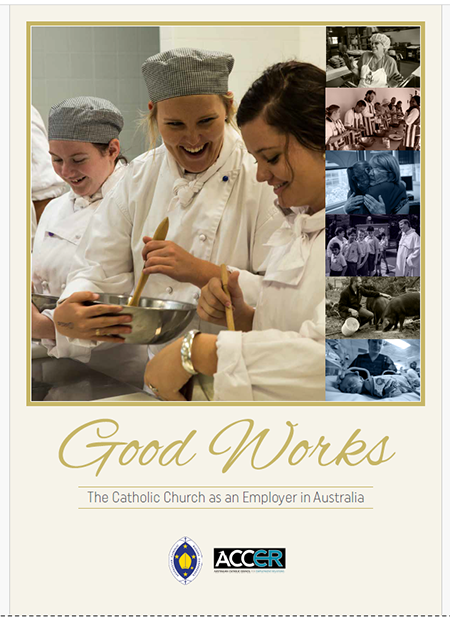Catholic employers should heed their own guidelines
Every guiding principle of industrial relations for Catholic organisations is laid out in the publication Good Works: The Catholic Church as an Employer in Australia, produced by the Australian Catholic Council for Employment Relations and the Australian Catholic Bishop’s Conference.
Victorian Catholic employers refusing their staff the right to fundamentals such as the right to industrial action may have missed the memo on the following:
On wages:
The Church believes that the wages and salaries of employees should be based on a strong sense of fairness and justice. “That is, the market should not be the sole arbiter of the rightful salary of an employee.”
In specific instructions for Church employers undertaking collective bargaining, Good Works states they “need to be aware of industry and community standards, and the historical nexus between wages and conditions in their own and other sectors”.
The protection of vulnerable workers and their families through a ‘living wage’ was the subject of a Statement made by the Australian Catholic Bishops Conference in 2005. The bishops said, “workers are entitled to a wage that allows them to live a fulfilling life and to meet their family obligations”.
On the right to industrial action:
“The right to strike or to withdraw one's labour is considered to be a basic right of every individual. It is recognised by Catholic Social Teaching as being legitimate in proper conditions and within just limits.”
“Recourse to a strike is morally legitimate when it cannot be avoided, or at least when it is necessary to obtain a proportionate benefit.”
“Church employers should only resort to common law remedies against the taking of industrial action if there is no other alternative and the intended action is being taken without regard for proper process or its consequences.”
“The right to withdraw one's labour should exist without the threat of personal sanctions or criminal charges being laid against the worker and without the threat, coercion, duress or intimidation of the worker to take, or not to take, the industrial action.
On union representation:
“Given the right to freedom of association, Church employers should recognise that trade unions have a legitimate interest in representing their members, be this in relation to compliance with awards and legislation, the representation of individual employees in grievance processes or in the negotiation of enterprise agreements.
“The right of employers and employees to form trade unions and employer associations is considered to be the proper and legitimate exercise of the right to freedom of association. The right to freedom of association is considered to be a fundamental freedom of a just society.”
Laborem Exercens (1981) states that trade unions are “a mouthpiece for the struggle for social justice, for the just rights of working people in accordance with their individual professions”.
In Rerum Novarum, Pope Leo XIII said the purpose of workers’ associations was to “secure, so far as is possible, an increase in the goods of body, of soul, and of property."
Pope St John Paul II (1981) states categorically in Laborem Exercens that a fundamental right of a worker is “the right of association, that is to form associations for the purposes of defending the vital interests of those employed in the various professions. These associations are called labour or trade unions”
Good Works also states, “Church employers should not use the law to render trade unions ineffective, so as to deprive them ‘of their proper role in the protection of rights of their members and the role they play in contributing to the common good’.”
On workload and work / life balance:
Every worker has the right to adequate rest. The employment relationship must take account of this right.
“Catholic Social Teaching places significance on the interaction between the family, society and work. It teaches that “work is ‘for man’ and not man ‘for work’. It is believed that the two areas of work and family life must support each other in such a way that work becomes a condition to make it possible to form a family. At one level, the family requires the wages that workers generally earn by undertaking work. At another level, family life requires something other than material resources. The time and care that parents are able to give their children is an essential element of a strong family life in which children develop as human beings and learn to take their place in society.”
“… it is not sufficient to ensure that the legal minimum standards are met. As a commitment to their employees, Church employers should implement preventative strategies for the safety of their employees without the imperatives of legislation..”
We support the vision of social justice, fairness and shared responsibility outlined in this guiding document. We’re happy to send a copy of Good Works to any employer still claiming that blocking workload protections or refusing to apply for a single interest authorisation is in workers’ best interests…
IEU members at St Andrews, Werribee.



